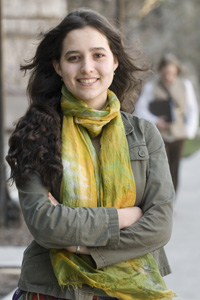Beinecke offers student chance to connect Russia, Persia
By Sarah Galersgaler@uchicago.edu
News Office
 Photo by Lloyd DeGrane Claire Saperstein |
|
Claire Saperstein came to the College with a seemingly disparate set of academic interests in literature, the Slavic world and Central Asia. Her drive and passion for these topics led her to an interdisciplinary major and helped her win a 2009 Beinecke scholarship.
Saperstein, a third-year in the College, concentrates in Fundamentals—the “great-books” major at the University—as well as Slavic Languages & Literatures. She also is pursuing a minor in Near Eastern Languages & Civilization.
“I had some huge questions about the uses of literature that I thought I would get a chance to address in a really focused way through Fundamentals. As for Slavic, I grew up overseas, and part of that time I spent in the former Soviet Union, in Uzbekistan, and I got the opportunity to begin studying Russian there. So when I came here, I was already really interested in Russian lit. When I was a kid, my family hung out alot with Afghans, and I always thought Dari (closely related to Persian) was a really beautiful language, though I didn’t study it much, so when I came to school here I started taking Persian.”
As a Beinecke scholar, Saperstein will receive $34,000 toward graduate study. Beinecke scholarships are awarded annually to about 20 students nationwide for graduate study in the arts, humanities and social sciences. Saperstein is the fourth College student in the last four years to receive the award.
Robert Bird, Chair and Associate Professor in Slavic Languages & Literatures, said, “Claire Saperstein has made the most of her abundant gifts and has continued constantly to strive for new areas and levels of knowledge. Both her academic performance and her personal conduct have been distinguished by a real wisdom and real humility, somewhat belying her years.”
Saperstein acknowledges that her unique academic interests seem a little disconnected, but insists there is more of a connection between them than most people think.
“Last fall, I went to St. Petersburg, Russia to study abroad,” she said. “One of my professors there helped me think about this more and introduced me to a woman who had done comparative Ph.D. work about a Russian writer who had lived in Persia. I’m still working on it, but a couple of my professors here in Chicago also have been quite helpful in finding points of connection between Persian and Russian literature.”
It is an area she is hoping to pursue further in graduate school with the help of the Beinecke scholarship.
“The award will help me navigate the often-treacherous waters of humanities funding, and help me keep working out the questions and ideas that brought me to Persian and Russian literatures in the first place. Also, it means I’ll get to keep reading and writing about texts I love.”
Lina Steiner, Assistant Professor in Slavic Languages & Literatures, recommended Saperstein for the Beinecke scholarship, saying, “The intersection of Russian, Uzbek and Persian cultures and literatures is an extremely promising venue for scholarship, which will definitely yield an interesting Ph.D. dissertation. Claire is well prepared to embark on this intellectual journey. I hope that she continues to receive institutional and financial support that would enable her to complete her exciting project.”
Saperstein praised the University for challenging her and enriching her studies, commending the resources available to her through the Joseph Regenstein Library, the faculty and her fellow students.
“There are so many fascinating students here,” she said. “Talking to anthropology, premed, classics, religious studies and philosophy students helps me think in ways I never would have discovered if I were cocooned in my own discipline. Most students here are really engaged in their studies and willing to talk about them.”
The Beinecke scholarship program was established in 1971 to honor wealthy brothers Edwin, Frederick and Walter Beinecke, who are best remembered for the donation of the Beinecke Rare Book and Manuscript Library to Yale University in 1963.
![[Chronicle]](/images/sidebar_header_oct06.gif)